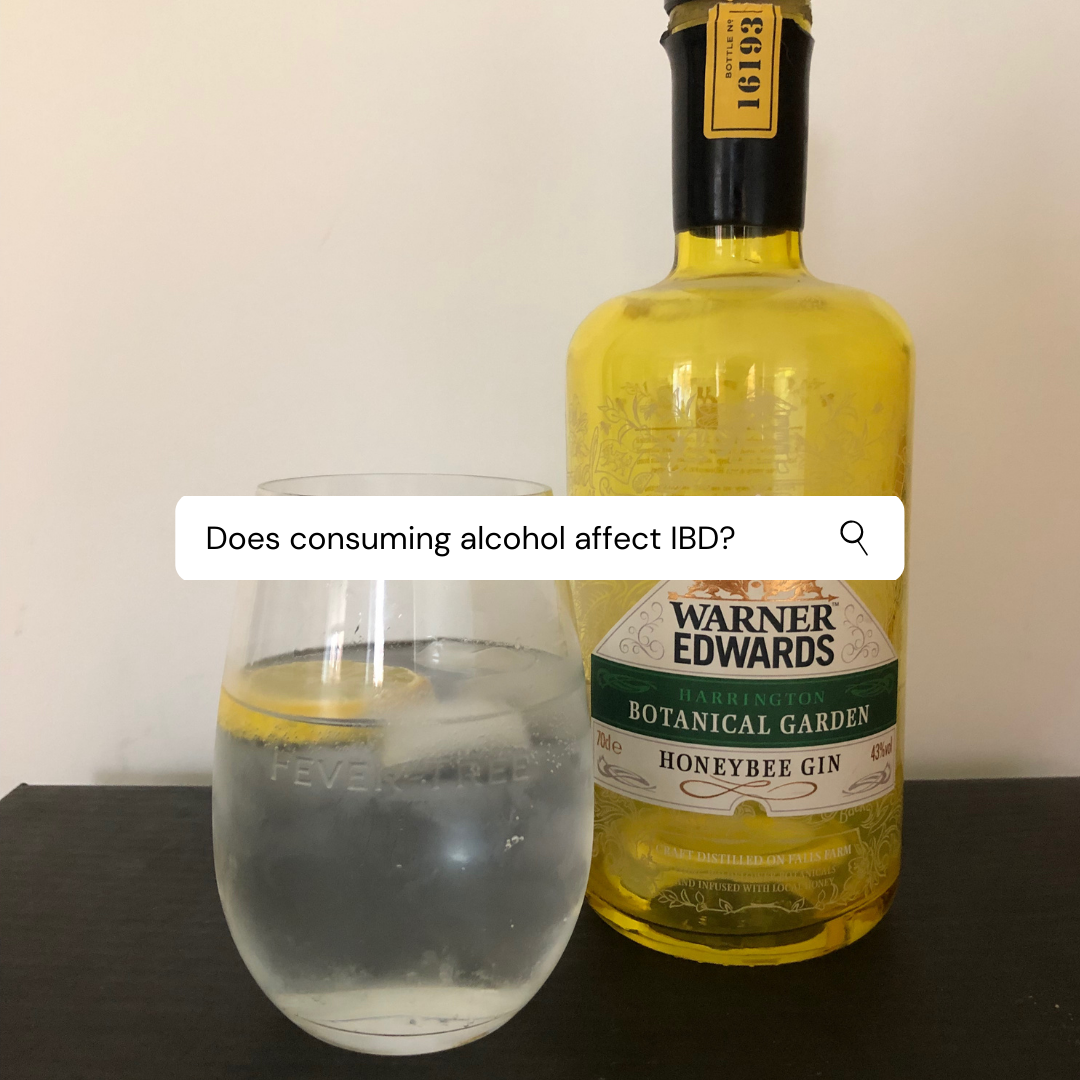
“Does consuming alcohol affect IBD?”
Hands up, who likes a drink to help them unwind at the end of a trying day or week, or to celebrate milestone moments?

Sometimes society can revolve around the pub (or at least it did, pre-pandemic) or going out for a cheeky drink or two. But what happens when you have a chronic illness that can manifest with chronic diarrhoea, medications which can affect your digestive system, as well as widespread inflammation with no known cause?
In the general public, they are told to avoid high consumption of alcohol – no more than 14 units per week in the UK. Chronic consumption can result in addiction, and go on to affect your digestive system as well as your liver and kidneys. Excessive drinking is sometimes part of the young adult popular as just part of the culture, but it can escalate quickly and without meaning.
How does alcohol affect your digestive system?
In large amounts, alcohol can overwhelm the gastrointestinal tract (GI) and liver and lead to damage both within the GI and in other organs. Specifically, alcohol promotes intestinal inflammation and, in turn, exacerbates alcohol-induced organ damage, creating a vicious cycle and leading to additional deleterious effects of alcohol both within the GI and in other systems.
What commonly comes from this is gastritis. Gastritis is inflammation of the stomach. It often develops in connection with some sort of infection, direct irritation or localised tissue damage. It can be acute or chronic, and it can be caused by:
- Taking non-steroidal, anti-inflammatory medications like aspirin or ibuprofen (i.e., NSAIDs).
- Certain bacterial infections.
- Bile reflux from proximal small intestine.
- Autoimmune disorders.
- Consuming too much alcohol.
Repeat alcohol abuse can result in damaging the lining of the stomach. This, in turn, can leave the stomach lining more vulnerable to the acidic digestive juices normally produced by the body to digest food. In some cases, it can make the stomach more sensitive to acids or other potentially inflammatory ingredients in foods themselves.
Beyond your stomach, alcohol also affects your liver and intestines:
- The liver removes toxins from the body. However, the liver breaks down alcohol into acetaldehyde, which poisons cells and causes inflammatory changes in the liver. This can lead to fatty liver disease, which is an increase in fat production in the liver. It can also lead to cell and tissue damage from the toxic by-products produced when alcohol is metabolized.
- Your intestines absorb the majority of alcohol – espeically if you drink on an empty stomach. The rest is excreted from your body through your stool and urine. Alcohol speeds up the rate of peristalsis – the contracting and relaxing of your colon -which doesn’t allow for water to be absorbed by your colon as it is normally. This causes your stool to come out as diarrhea, often very quickly and with a lot of extra water.
Scientists have found that drinking small amounts of alcohol tend to speed up the rate of digestion, causing diarrhoea. And on the other end of the spectrum, drinking large amounts of alcohol can delay digestion and cause constipation. Alcohol can also irritate your digestive tract, worsening diarrhoea. Scientists have found this occurs most often with wine, which tends to kill off helpful bacteria in the intestines.
How is this different with IBD?
Acute and chronic alcohol consumption have been shown to modify the immune system and could therefore play an important role in IBD. A snippet from a medical journal (see reference no. 3 for the full article):
- “Acutely, alcohol consumption has been shown to inhibit the immune system by decreasing T cell activity and interlukin (IL)-12 levels in healthy controls (Mandrekar et al., 2004) .
- Alcohol can also increases monocyte production of anti-inflammatory cytokines such as IL-10 (Norkina et al., 2007).
- Chronically, alcohol increases liver Kupffer cell activity and is associated with increased generation of proinflammatory mediators such as TNF-α, IL-1, and IL-6 (Khoruts et al., 1991).
- Alcohol has also been shown to acutely disrupt gut barrier function, and can increase intestinal permeability in human subjects (Keshavarzian et al., 1994) to which patients with IBD are particularly susceptible (Wyatt et al., 1997).”
This supports the fact that alcohol can affect the effectiveness of medications for IBD, such as biologics.
Things to look out for and be mindful of
Drinking alcohol when you have IBD is a personal choice. This is in no way a post on pushing my own agenda, but more exploring the facts behind excessive consumption and the effects alcohol can have on your health. In recent studies, when asked about the effects of alcohol on IBD patients, there was a split between it causing negative effects and no effect. Alcohol can be a flare trigger for some, but not others. It is very personal.
However, some other side effects that alcohol can cause might be more important. These include:
- Anaemia – which is also a common complaint for people with IBD
- Worsen existing liver disease – chronic liver disease is a serious complication of IBD.
- Short-term effects of alcohol can cause diarrhoea, vomiting and drowsiness.
- Long-term effects include ulcers, gastritis (inflammation of stomach walls), malnutrition.
- Alcohol can also interact with some medications taken to help control IBD.

Until next time,

Do you have any questions or queries? Or just want to share your own experiences? You can leave me a reply here or leave comments via my social media accounts – on Twitter, find my blog page on Facebook and over on Instagram
If you enjoyed this post check out Coming Off The Radar and It’s the Small Things that Have the Biggest Impact
Further Reading / References:
Alcohol and Gut-Derived Inflammation – Faraz Bishehsari, M.D., PhD et al, Alcohol Research, 2017.
Healthline – Why do I get Diarrhea after Drinking Alcohol
Pattern of Alcohol Consumptions and its Effects on Gastrointestinal Symptoms in Inflammatory Bowel Disease – Garth R. Swanson, MD, et al. Alcohol May 2010.
IBD Relief – Alcohol & IBD
Healthline – Alcohol and Crohns Disease



